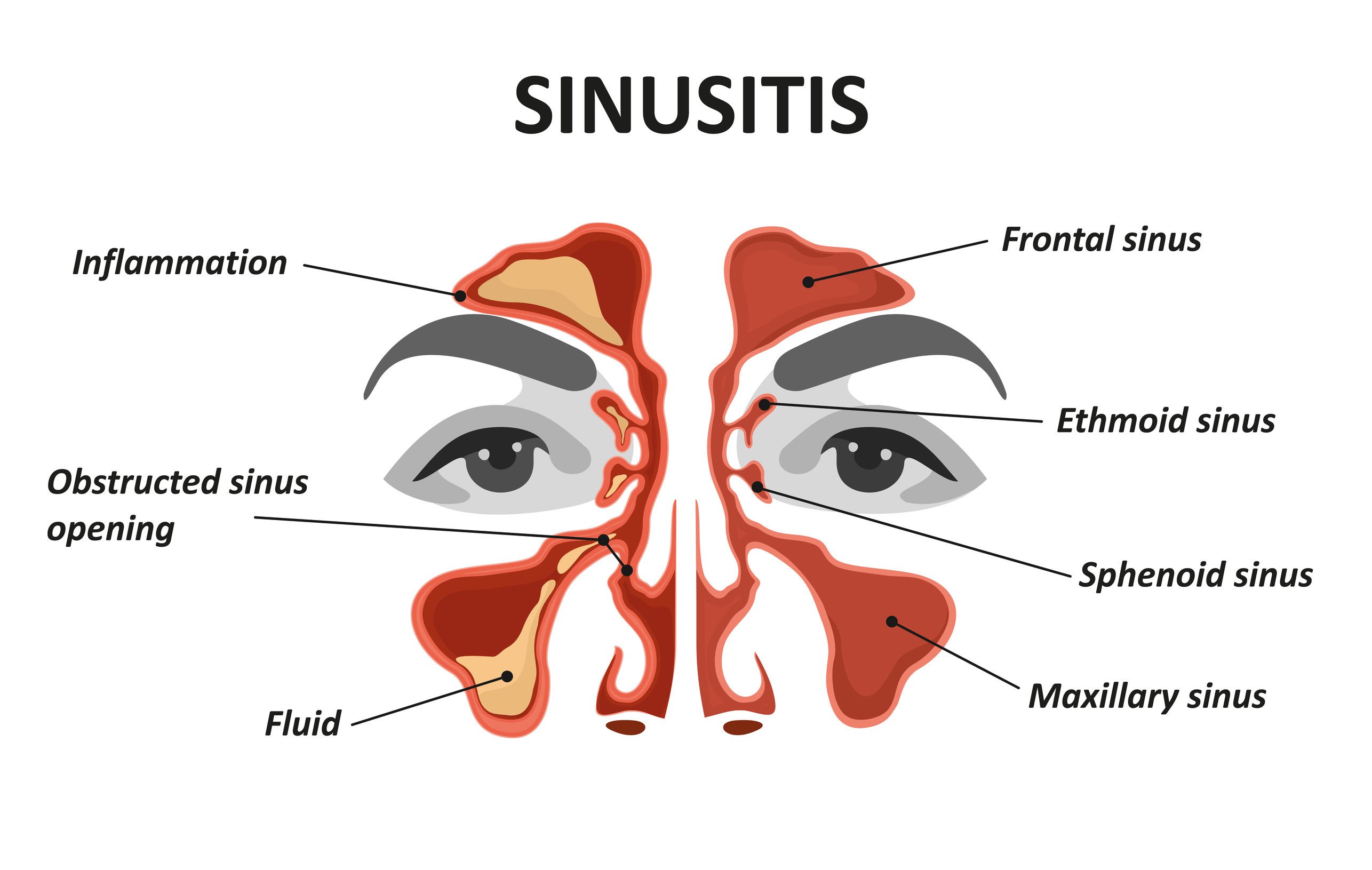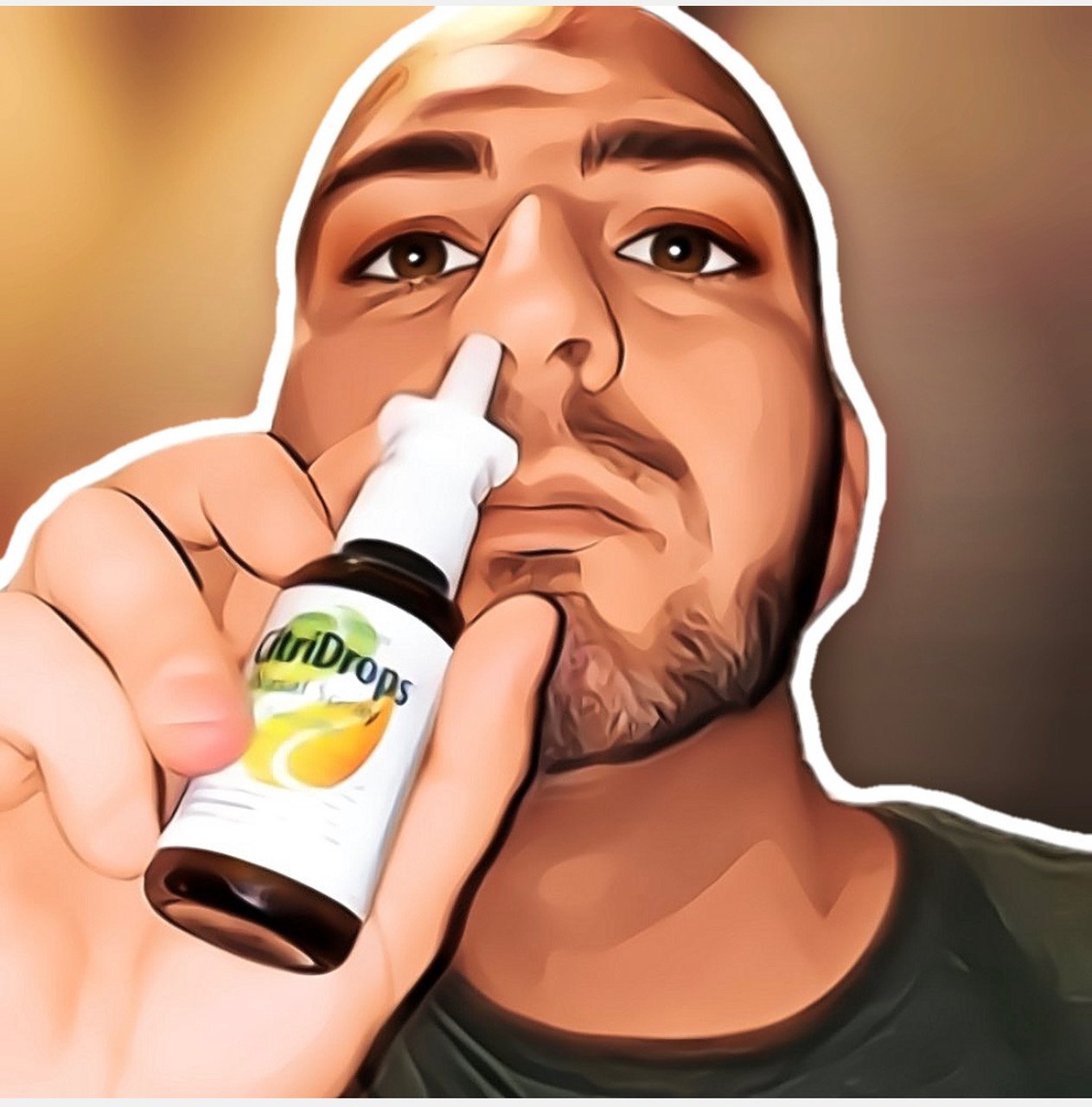Unfortunately, sinus infections are a nuisance that most people have dealt with at some point in their lives.
There are many different possible causes of sinus infections, but in this article, we will focus on fungal sinus infections, which means it was caused by mold.
Having been a mold assessor by trade since 2007, I have struggled with chronic sinusitis on multiple occasions. As I got older and dealt with more and more mold issues in residential and commercial properties, I realized that the best way to treat the recurring sinus infections was to prevent it in the first place.
While the information below has some scientific evidence from other sources, what you are about to read will include my first-hand experience of preventing fungal infections, but keep in mind I’m not a doctor!
So before trying anything I am laying out to you, you should consult with your physician.

How Common Are Sinus Infections?
Based on the disease burden, a sinus infection is a significant health issue in the US.
According to the American College of Allergy, Asthma & Immunology, sinus infection afflicts over 30 million people in America each year.
The amount of money spent on the disease stands at over $1 billion annually. Most of this money is spent on buying Over-The-Counter drugs. Statistics also show more than 15 million doctor visits each year are attributed to sinus infections.
The people at high risk of developing the infection are those suffering from structural blockages in the nose, allergy, and compromised immune systems.
The main symptoms of a sinus infection include facial pain, postnasal drip, foul breath, nasal congestion, and headache.
People with bodily defects also stand a high risk of developing a sinus infection. The weaknesses include the narrowing of the sinus openings, nasal polyps, and partitioning issues between nasal passages.
The sinuses constitute several air-filled and interconnected cavities of the skull. The sinuses include the Maxillary sinus, Frontal sinus, and Ethmoid sinus.
A normal sinus features a thin layer of mucus and hairy projections that play an essential role in capturing germs, dust, and other particles suspected in the air.
Sinus infection or sinusitis is largely caused by a bacterial infection.
However, studies also show sinus infection may be caused by certain types of mold, fungi, and viruses.
Sinus infection can either be acute or chronic, depending on how long it lasts. Although acute sinusitis may die off naturally without treatment intervention, select medications such as antibiotics can help clear the nasal passages faster.
According to Harvard Medical School, acute sinusitis initially incubates as a cold before developing into full-blown sinusitis. This usually happens when the nasal passages block, thereby setting up a second round of infection.
How Mold Causes Sinus Infections
Look:
Mold is found everywhere, both indoors and outdoors. It can be on your clothes, in your furniture, in your air conditioning, etc.
Because of this, mold-induced allergies are common in for some people throughout the year.
But some people are more susceptible to getting sinus infections.
According to the North Atlanta ENT and Allergy Center, the genes in the DNA may cause some people to be prone to getting a sinus infection. The DNA predisposition is widely blamed for cases of chronic sinusitis.
While genes play a substantial role, anybody can develop sinus issues from mold under the right conditions. 
How To Determine If Mold Is Causing Sinus Issues
Before the impact of sinusitis becomes evident, the body’s immune system will try to fight the infection by releasing the eosinophils chemical to fight the fungus.
It is essential to recognize that fungi readily thrives inside the sinus because of the same reason mold will thrive in a home:
Mold loves damp and dark environments.
A blood test and skin test can be performed to determine if the sinus infection is viral, bacterial, or fungal.
The radioallergosorbent blood test measures the immunity level by capturing the quantity of immunoglobin E (IgE) antibodies. The final clinical determination is usually made by checking the blood’s sensitivity to individual molds.
The skin test is usually carried out on the arm. The doctor will perform the analysis by pricking the skin before applying localized allergens. If the skin develops hives, the clinician can conclude susceptibility to the allergens found in the environment.
Where Is The Mold Coming From?
If you received results indicating you indeed have a fungal sinus infection, you mustn’t just treat it and move on with your life.
While the mold that affected you may have originated outdoors, which you cannot control, there is a more likelihood that the mold originated in your home.
Remember:
Mold is everywhere. What you need to verify is that there is not a mold problem caused by water damage. This is where the real bad mold, such as the so-called “black mold,” can grow.
Other types of mold can be harmful, as well.
A mold inspection may be necessary.
Having a professional mold inspector can look in places that you wouldn’t even think to watch, like behind baseboards and in the attic.
Removing yourself from an environment that may increase your chances of getting a fungal infection caused by mold damage is the first step in preventing sinus infections caused by mold and black mold.
Mold remediation may be necessary to return your home to a healthy fungal environment.
How To Prevent Fungal Sinus Infections
Sinus infections from mold exposure can, fortunately, be prevented much of the time. Certain precautions and daily steps can dramatically reduce your chances of mold sinus problems.
Let’s take a look at some steps you can take:
• Control Your Food Intake-If you live in the United States, the FDA has very loose restrictions regarding mycotoxins in food. Changing your diet may be necessary. Avoid consuming mycotoxins laden foods (i.e., cottonseed, figs and certain types of cheese)
• Drinking Tons Of Water – drinking water regularly is a great way to enhance your health and wellbeing. These benefits often extend to the mucosal membrane by keeping the mucus thin and loose.
• Elevate Your Head While Sleeping – if you sleep with your head in a lower position, the mucus in your membrane is likely to pool and cause problems. This problem can be easily overcome by sleeping with your head raised high on a pillow.
• Inhale steam – steam from hot water can help moisten and clear out the nasal passages. You can do this by taking an extended hot steam bath or shower. The alternative is to put hot water on a basin and cover your head in a towel to absorb or inhale the steam.
• Use An Air Purifier – Air purifiers can remove mold spores in the air and reduce your chances of fungal infections.
• Only use prescribed antihistamines – antihistamines will ordinarily thicken the mucus and toughen the nasal discharges. A doctor may prescribe antihistamines to patients with allergy-triggered sinus infection. The antihistamines work by targeting the histamine receptors.
• Avoid Dry Environments – to keep your nasal passages in good condition or from drying out, place a humidifier where you sleep or work. The device should be kept clean at all times to prevent the accumulation of mold and bacteria.
Secret Weapon To Prevent Sinus Infections Due To Mold
When I was experiencing chronic sinusitis over the early part of my career, it was extremely challenging and discouraging.
It wasn’t until about my 5th year or so that the doctor said something along the lines to me:
“Considering you rinse your nose because you deal with mold, you shouldn’t really be getting sinus infections this often”
Well:
Needless to say I say was a little baffled on why he thought I was washing my nose when that was the first time I was hearing about it preventing sinus infections.
Your nose is your body’s air filter. The mold spores go in through your nose to get to your sinuses.
It all made sense to me!
It’s not limited to just mold either. Viruses tend to stay in your mucus for up to a few days before entering your blood stream. So, cleaning your nose can help your prevent getting sick altogether.
Rinsing your nose with a saline solution and water every morning and evening before you go to sleep is ideal.
I would be lying to you if I told you that I rinse my nose every morning and evening. It’s hard to keep up with!
I would go through spurts where I would wash my nose religiously and then I would go through periods where I slacked a little bit.
Overall, my sinus infection rate was extremely low compared to when I first started working in the mold industry.
Recently, that rate went up even higher because I started using a stand-along nasal spray that takes all of 10 seconds to administer. It’s hard to get lazy when I can spray the solution into my nostrils that quickly!
Conclusion
Can mold cause sinus infections? The answer is affirmative. That is why you must take every precaution if you feel you have been exposed to excess mold spores.
You now know how to prevent fungal sinus infections, but ultimately it will be up to you to stop it from happening!
Do you have any tips in reducing the risk of mold sinus infections? I’d love to hear from you!

Meet the author: Brad Fishbein is an ACAC council-certified Microbial Investigator. In the fall of 2012, he became a Licensed Mold Assessor in the State of Florida through the Department of Business & Professional Regulation. Brad has helped homeowners with over 5,000 successfully completed Mold Inspections since 2009.

